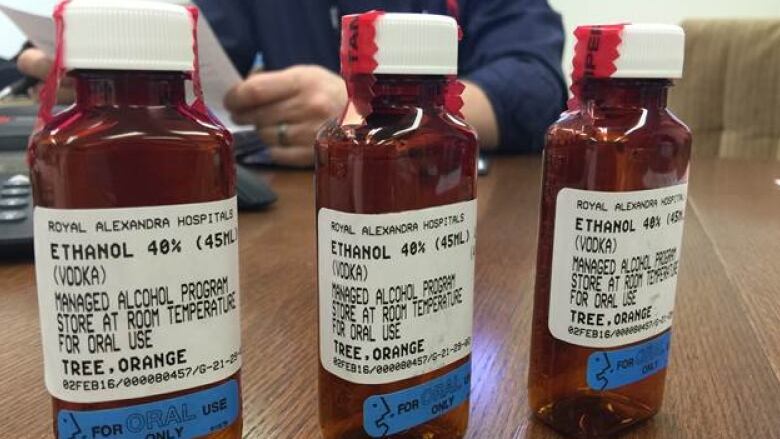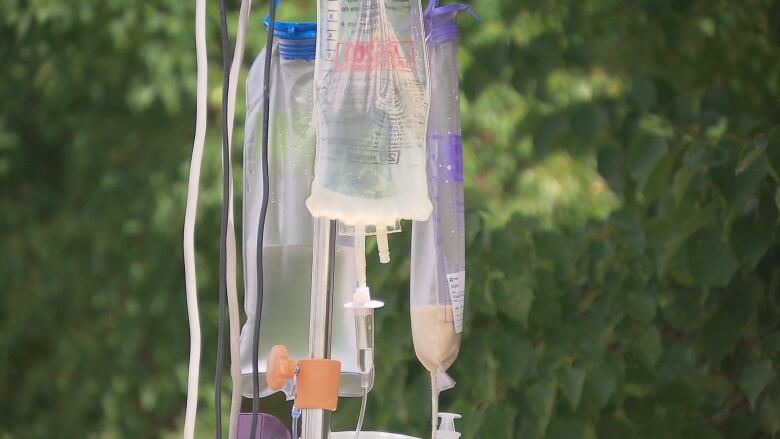A prescription for liquor: Royal Alex program helping people with severe alcoholism
Doctors are allowing severe alcoholics to drink under medical supervision

People who struggle with severe alcoholism don't have to stop drinking entirely thanks to anew program at the Royal Alexandra Hospital, whichallowsdoctors to prescribe alcohol to patients.
The program at the north Edmonton hospital's Addiction Recovery and Community Health Clinicis one of the first in-hospital managed alcohol programs (MAPs) in Canada.
- New alcoholic treatment centre in Vancouver keeps drinking on the table
- Give an alcoholic an hourly drink: Why a controversial Canadian program is catching attention in Australia
The program launched in December 2016, and about 15 patients have participated so far, saidDr.KarineMeador, assistant director of the Inner City Health and Wellness program, which runs the MAP.
Hospital patients are typically prescribed up to six 45 millilitre(1.5 ounces)doses of vodka aday, which are consumedintwo orthreehour intervals.
Patients drink the alcohol instead ofreceivingit through an IV to allow fora sense of autonomy.

Participants were being treated in hospital for other ailmentsbefore entering the program.
The first person to take part inthe initial pilot was homeless, and was being treated for alcoholism-related health problems.
"He was a patient that was never going to quit drinking and we knew that, so it allowed us to keep him happy and stable in hospital," said Monica Cookson, a registered nurse at the Royal Alexandra Hospital.
"I think he was just really appreciative. He got treated for his medical problems, but he also had his mental well-being looked after."
After the patientwas discharged, he moved to an Edmontonhousing organization that has a managed alcohol program. MAPsin Edmonton started in housing facilities before the program was established at the Royal Alex.
Redefining success
Having the program in-hospital helpskeeppatientsaround long enough to complete their treatment, as patients sometimesleave the hospital toget alcohol,Meadorsaid.
She said physicians who specialize in the treatment of substance abusehave toshift their thinking in order to allow addicts to continue to use drugs or alcohol.
Success doesn't necessarily have to mean that somebody quits alcohol or stops their drug use.- Dr.KarineMeador, Inner City Health and Wellness program
"It's about reframing what you see as success," Meadorsaid."So success doesn't necessarily have to mean that somebody quits alcohol or stops their drug use. Success can mean that they are simply more stable in their lives, or more stably housed."
Meadorsaid the program has helped participants reduce their daily alcohol consumption. Some patients who previously drank a26-ouncebottle of liquor each day cut back to five or six drinks a day.

Before introducing thetreatment program, the Addiction Recovery and Community Health Clinic established aharm-reduction programfor patients addicted toopioids.
"I'm not sure why this hasn't been done before,"Meadorsaid."We kind of impose that artificial need for abstinence in hospital. But realistically we know that most people who struggle with a substance use disorder outside the hospital, they are going to continue to struggle with that substance use disorder in hospital.
"So it just makes sense to extend that harm-reduction thinking into an acute care setting."
Canadian substance-abuse researchers said while formal managed alcohol programs arenew in Canada, doctors have prescribed alcohol to patients for years,on a case-by-case basis.
An alternative for treating withdrawal
Withdrawal can be fatal for people who are physically dependent on alcohol, Meador said. Withdrawal begins 12 to 24 hours after an alcoholicstops drinking,and begins with symptoms including tremors, anxiety and nausea. Left untreated, it can trigger more severe symptoms.
"That's where they get confused and delirious," Meadorsaid. "[They] don't know where they are, don't know who they are they're seeing things, they're hallucinating.
"If this is untreated, then there's a high risk of then having seizures and cardiac arrhythmia, which can lead to death."
In Canadian hospitals, the most common approach for treating alcohol withdrawal is to prescribe an anti-anxiety and muscle relaxant medication called benzodiazepine, thoughthere isn't a standard hospital protocol for treating alcohol withdrawal syndrome.
A 2018 report published in the Drug and Alcohol Review journalfound that 19 U.S. hospitals have researched the use of alcohol prescriptions. And while there isn't astandardized approach in those hospitals either,patients were typically given alcohol through an IV.
By administering controlled doses of alcohol to Royal Alex patients every few hours, withdrawal can be avoided.
Helping vulnerable people
A 2016 study from the Harm Reduction Journal on a MAPin a Thunder Bay housing facility quoted an unnamed participant, who said the programhelped stabilize their drinking.
"I could still be drunk every day if I wanted to, with the people I was on the street with. Since coming here, I drink wine I don't think about buying anything else, you know like the other garbage like antiseptic, hairspray, all the other stuff that you know that I used to consume when I was out there."
Alcohol users... they are not always a popular group and often they are at the bottom of the pecking order in terms of attention and care.- Tim Stockwell, researcher
A University of Victoria Canadian Managed Alcohol Program Studyfound thatMAPsparticipants are less of a danger to themselves andothers.
Tim Stockwell,one of the authors of the study, said programs like the one at the Royal Alex are rarely publicizedfor fear of losing funding, asstigma is a key barrier to gaining more support for alcohol management services.
"You talk to people on the streets and the most stigmatized are homeless people using alcohol,"Stockwell said.
"There are so many services for people using injection drugs, but alcohol users... they are not always a popular group and often they are at the bottom of the pecking order in terms of attention and care and service provision."












_(720p).jpg)


 OFFICIAL HD MUSIC VIDEO.jpg)
.jpg)



























































































